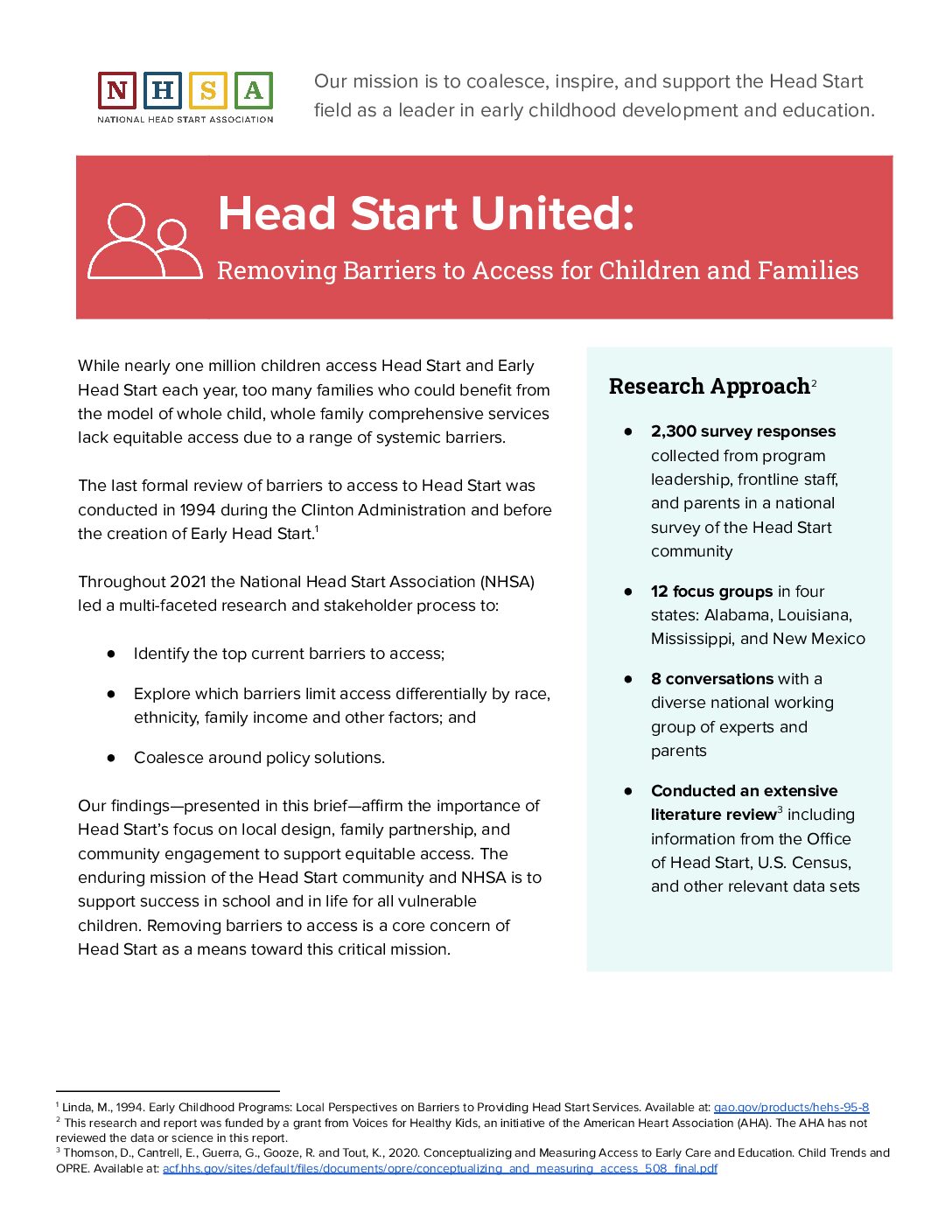Head Start United affirms the importance of Head Start’s focus on local design, family partnership, and community engagement to support equitable access.
While nearly one million children access Head Start and Early Head Start each year, too many families who could benefit from the model of whole child, whole family comprehensive services lack equitable access due to a range of systemic barriers. The last formal review of barriers to access to Head Start was conducted in 1994 during the Clinton Administration and before the creation of Early Head Start.
After conducting a national survey of the Head Start community, which generated 2,300 responses from program leadership, frontline staff, and parents, hosting 12 focus groups including partners in four target states (Alabama, Louisiana, Mississippi, and New Mexico), holding eight conversations with a diverse national working group of experts and parents, and conducting an extensive literature review, including information from the Office of Head Start, U.S. Census, and other relevant data sets, NHSA identified seven critical barriers to access:
- A lack of transportation and outdated geolocation of center-based care
- Various family socio-economic issues related to living in poverty, including housing instability, frequent moves, and an inability to be contacted reliably
- Low income eligibility limits and a lack of subsidized alternatives
- A lack of overall supply, especially of birth-to-three Early Head Start slots
- Inadequate hours of service for some Head Start families
- A workforce crisis, including hiring challenges, turnover, and difficulty finding diverse staff
- A lack of parent awareness of Head Start’s services and a perceived bias for school-based services
Head Start United and the reesearch behind it funded by a grant from Voices for Healthy Kids, an initiative of the American Heart Association (AHA). The AHA has not reviewed the data or science in this report.
Removing Barriers to Access to Head Start and Other Programs for Eligible Children and Families
Watch this webinar recording and access a full list of resources (listed below) to:
Speakers:
- Erin Hardy, Senior Research Scientist, NORC
- Kent Mitchell, Senior Director of State Affairs, NHSA
- Natalie Renew, Executive Director, Home Grown
- Kathyrn Tout, Vice-President for Early Childhood Research and Partnerships, ChildTrends
Resources:
- Head Start United: Removing Barriers to Access for Children and Families
- Defining and Measuring Access to High Quality Early Care and Education (ECE): A Guidebook for Policymakers
- Conceptualizing and Measuring Access to Early Care and Education
- Supporting Families’ Access to Child Care and Early Education: A Descriptive Profile of States’ Consumer Education Websites
- Measuring and Comparing Multiple Dimensions of Early Care and Education Access
- Defining and Measuring Access to Child Care and Early Education with Families in Mind
- Parents’ Reasons for Searching for Early Care and Education and Results of Search: An Analysis Using the Access Framework
- Using the Access Framework to Guide Child Care Policy during the COVID-19 Crisis
- Advancing racial equity through neighborhood informed early childhood policies
- Early Head Start application resources for HBCC
- Enhancing Comprehensive Services in Family Child Care with Early Head Start Partnerships
- Comprehensive Services in Home-Based Child Care Networks

